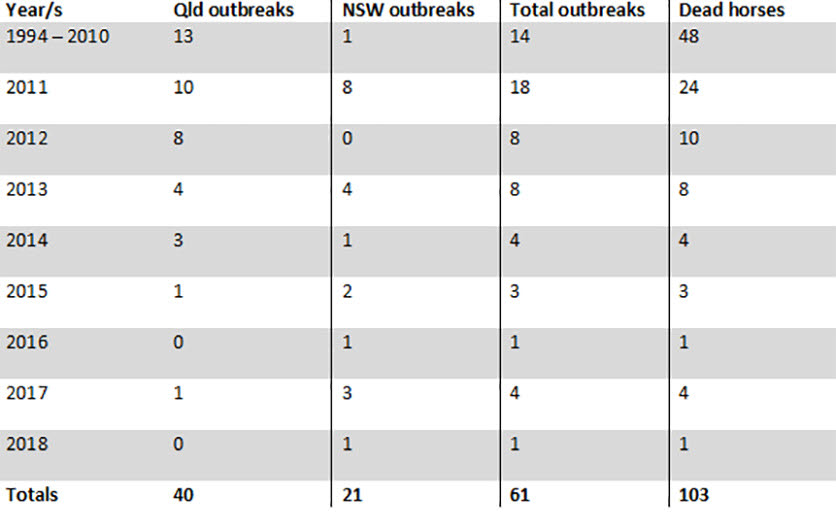The story so far

From 1994 to November 2018, there have been 61 known outbreaks of Hendra resulting in the death of 103 horses, with a 79% mortality rate. Survivors were euthanased according to the former national policy.
In this period Queensland has recorded 40 outbreaks and NSW 21 outbreaks.
From 2011 to November 2018 there have been 47 outbreaks resulting in the death of 55 horses with Queensland recording 27 outbreaks and NSW recording 20 outbreaks. By way of comparison NSW only recorded one outbreak from 1994 – 2010.
There have been seven confirmed cases in people, all of whom had significant contact with horse body fluids. Of those who tested positive for Hendra, four died of the disease, including two veterinarians, Dr Ben Cunneen in 2008, and Dr Alister Rodgers in 2009.
Monoclonal antibody m102.4 has been offered on compassionate grounds and used as a post-exposure therapy to treat 13 Australians heavily exposed to naturally infected horses since 2009. Unfortunately, in 2009, it was unsuccessful due to an advanced progression of the disease in that patient. The other human cases were a mother and daughter from Tewantin in 2010, a Rockhampton woman in 2012, 6 people from NSW and Queensland in 2014, and three people including two children in 2017, two laboratory workers, one in the USA and one in Australia, have also been treated with the monoclonal antibody.
Following on from the release of the vaccine in late 2012 there has been a steady decline in the number of Hendra virus outbreaks in horses in both States, with all 20 cases having occurred in unvaccinated horses. No fully vaccinated horses have ever been infected and developed disease.
Hendra in 2016 -2018
Following on from full registration being granted by the APVMA for Equivac® HeV in August 2015, there have been six recorded disease outbreaks of Hendra virus. One in NSW at Kyogle in December 2016 one in Queensland at Tambourine Mountain in May 2017, two in Lismore in July 2017, one in Murwillumbah in August 2017, and one in Piggabeen NSW in September 2018.
In other significant developments in 2016 the Equivac® HeV vaccine was approved for use in pregnant mares in January 2016 and the 12-month duration of immunity, following two initial doses and a booster at 6 months, was approved by the APVMA in May 2016.
In June, the Queensland Chief Medical Officer announced successful results of the safety studies of the m102.4 monoclonal antibody Phase 1 human clinical trial conducted at the Queensland Institute of Medical Research
On 25 February 2016, the Queensland Legislative Assembly agreed to a motion that the Agriculture and Environment Committee inquire into and report on the Equivac ® HeV vaccine and its use by veterinary surgeons in Queensland. The Agriculture and Environment Committee called for submissions and 300 were received. Public hearings were held throughout Queensland 4-7 July, and AVA provided a detailed submission and appeared before the Committee in Parliament House on 6 July. The Government released its responses to the Committee's eleven recommendations on 21 April 2017. The Government announced that currently it does not support mandatory vaccination for every horse in Queensland but supports the right and discretion of equestrian event organisers to require vaccination as a condition of entry for equestrian events on the basis of their own informed risk assessment.
From 2015 to 2017 the Queensland Workplace Health and Safety Authority prosecuted three veterinarians over their handling of positive Hendra virus cases. These cases have now been heard in court. In all three cases, no conviction was recorded against the veterinarians. They are free to continue practising.
Hendra outbreaks in Queensland and New South Wales (current as of December 2018).

